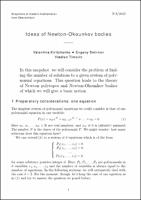Search
Now showing items 1-10 of 18
Domino tilings of the Aztec diamond
[SNAP-2015-016-EN] (Mathematisches Forschungsinstitut Oberwolfach, 2015)
Imagine you have a cutout from a piece of squared paper and a pile of dominoes, each of which can cover exactly two squares of the squared paper. How many different ways are there to cover the entire paper cutout with ...
Minimizing energy
[SNAP-2015-002-EN] (Mathematisches Forschungsinstitut Oberwolfach, 2015)
What is the most efficient way to fence land when you’ve only got so many metres of fence? Or, to put it differently, what is the largest area bounded by a simple closed planar curve of fixed length? We consider the answer ...
Friezes and tilings
[SNAP-2015-004-EN] (Mathematisches Forschungsinstitut Oberwolfach, 2015)
Friezes have occured as architectural ornaments for many centuries. In this snapshot, we consider the mathematical analogue of friezes as introduced in the 1970s by Conway and Coxeter. Recently, infinite versions of such ...
Modeling communication and movement: from cells to animals and humans
[SNAP-2015-006-EN] (Mathematisches Forschungsinstitut Oberwolfach, 2015)
Communication forms the basis of biological interactions. While the use of a single communication mechanism (for example visual communication) by a species is quite well understood, in nature the majority of species ...
Special values of zeta functions and areas of triangles
[SNAP-2015-010-EN] (Mathematisches Forschungsinstitut Oberwolfach, 2015)
In this snapshot we give a glimpse of the interplay of special values of zeta functions and volumes of triangles. Special values of zeta functions and their generalizations arise in the computation of volumes of moduli ...
Quantum diffusion
[SNAP-2015-014-EN] (Mathematisches Forschungsinstitut Oberwolfach, 2015)
If you place a drop of ink into a glass of water, the ink will slowly dissipate into the surrounding water until it is perfectly mixed. If you record your experiment with a camera and play the film backwards, you will see ...
Zero-dimensional symmetry
[SNAP-2015-003-EN] (Mathematisches Forschungsinstitut Oberwolfach, 2015)
This snapshot is about zero-dimensional symmetry. Thanks to recent discoveries we now understand such symmetry better than previously imagined possible. While still far from complete, a picture of zero-dimensional symmetry ...
Chaos and chaotic fluid mixing
[SNAP-2015-005-EN] (Mathematisches Forschungsinstitut Oberwolfach, 2015)
Very simple mathematical equations can give rise to surprisingly complicated, chaotic dynamics, with behavior that is sensitive to small deviations in the initial conditions. We illustrate this with a single recurrence ...
Modelling the spread of brain tumours
[SNAP-2015-013-EN] (Mathematisches Forschungsinstitut Oberwolfach, 2015)
The study of mathematical biology attempts to use mathematical models to draw useful conclusions about biological systems. Here, we consider the modelling of brain tumour spread with the ultimate goal of improving treatment ...
Ideas of Newton-Okounkov bodies
[SNAP-2015-008-EN] (Mathematisches Forschungsinstitut Oberwolfach, 2015)
In this snapshot, we will consider the problem of finding the number of solutions to a given system of polynomial equations. This question leads to the theory of Newton polytopes and Newton-Okounkov bodies of which we will ...










